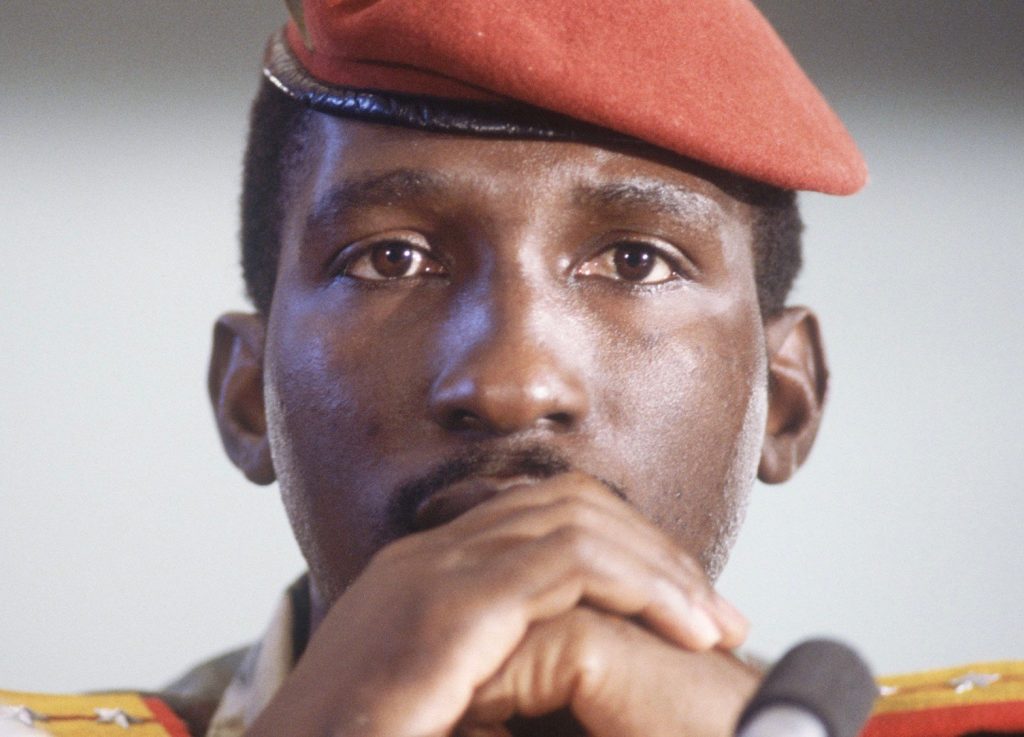October 15, 1987: The Murder of Thomas Sankara
Note left at Thomas Sankara's graveside: “Mama Sankara, your son will be avenged. We are all Sankara.”

Thomas Sankara.
To say that Thomas Sankara was isolated is a dreadful understatement. It was his very political exclusivity that generated the total separation from organisations, groups, parties and trade unions who could have supported his initiatives and defended the ‘revolution’ against the military. By 1987 Sankara was only really vulnerable to counter-coups from within the military. Opposition, under his instructions, had been marginalized or worse, and resistance inside the unions and among the broader radical left suppressed.
The counter-coup in October 1987 was ruthlessly planned and executed. Sankara’s was – with only a small militant core by his side – exceptionally exposed. In the morning of 15 October, 1987 he had discussed the situation facing the regime with Valère Somé, his advisor and comrade, at the presidential residence. His recent biographer Ernest Harsch takes up the story, ‘That afternoon, Sankara had a scheduled meeting with his small team of advisers. They gathered about 4:15 p.m. at the old Conseil de l’Entente headquarters, which for some time had served as an office of the National Conseil national de la révolution (CNR). The meeting was under way for only a brief time when shooting erupted in the small courtyard outside, around 4:30 p.m. or shortly after. Sankara’s driver and two of his bodyguards were the first to be killed. Upon hearing the gunfire, everyone in the meeting room quickly took cover. Sankara then got up and told his aides to stay inside for their own safety. “It’s me they want.” He left the room, hands raised, to face the assailants. He was shot several times, and died without saying anything more. If his exit from the room was intended to save his comrades inside, it failed. The gunmen, all in military uniform, entered the meeting room and sprayed it with automatic weapons fire. Everyone inside was killed, except for Alouna Traoré.’ Sankara’s brief unwavering ‘revolutionary’ moment was over.
Blaise Compaoré, Sankara’s comrade and murderer, quickly denied involvement, claiming he was at home and sick. He may not have actually pulled the trigger, but it was his men who did and they would not have acted without a clear order. By the evening of the assassination Compaoré was the new president.
Tens of thousands of Burkinabès were inspired by Sankara’s radical government, by their presidents sheer, restless commitment to a transformation that they also wanted to see. However there is a difficult truth about the regime which cannot be ignored. Sankara was terribly alone, apart from a few other leading militants; his project was delivered to Burkinabè society from above. Eventually Sankara even existed above the military hierarchy from which he had issued. Only Valère Somé and a few others stood beside him to the end.
The lack of any serious popular mobilization against the counter-coup, expressed the tragic, confirmation of the fallen regimes isolation. Undoubtedly, thousands of Burkinabès were deeply distressed by Sankara’s murder and the sudden end to a project that contained many popular desires, but still their reaction, without organizational expression, was severely constrained. When Harsh describes how there were processions, ‘to the Dagnoën cemetery to pay their respects at his graveside’, these displays of public grief confirm the highly ambiguous space the regime occupied. ‘Some laid flowers and wept. Others left handwritten messages: “Long live the president of the poor.” “The jealous, power-hungry, and traitors murdered you.” “Mama Sankara, your son will be avenged. We are all Sankara.” “Is it possible to forget you?” “A hero never dies.” The new regime, under Compaoré, quickly undertook the project of normalization and returned Burkina Faso to its place on the outer margins of global political-economy.



















